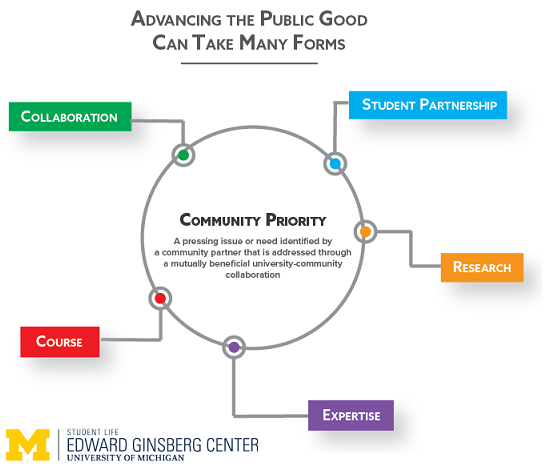The Ginsberg Center uses the term community engagement to describe any scholarly endeavor -- courses, research, service, or other learning experiences -- that puts community-defined needs at its center. 'Community-engaged' describes a hands-on experience within a community that has several key components:
- Addresses societal needs not currently being fully met by other sectors
- Produces reciprocal benefits for community partners, campus partners, and students
- Intentionally integrates community-based needs and academic learning objectives
- Prepares students for engagement and promotes ongoing reflection and/or critical analysis
- Interrogates structures of inequality and questions the distribution of power
- Supports the development of a lifelong commitment to civic engagement
Community partners are active participants in the process of identifying needs and developing appropriate interventions and projects to address these needs. Faculty, staff, and students work in collaboration with community partners to consider the impact on communities before, during, and after community engagement.
Community-engaged teaching, research and scholarship advances:
- U-M's Mission:
- As a public institution of higher education, U-M's mission calls faculty and staff to work in the service of the public good.
- Your Public Impact:
- This affordable housing graphic (accessible text-based version) shows how a single community-defined priority can lead to a variety of teaching, research, and learning opportunities. Starting from community-defined priorities does not limit the scope or focus of your research and teaching agendas; it expands and deepens your impact, as your ideas evolve in collaboration with community partners. It ensures that community voices are at the center of your work and that your public impact is aligned with what communities know about their own needs.
- Student Learning & Development
- Community-engaged teaching & learning is a high impact practice. Evidence shows that participation in these activities has the greatest positive impact on students' academic success, graduation rates, personal and interpersonal development, and other measures of learning (NSSE 2008).
- Commitments to Civic Engagement & Social Change
- Community-engaged scholarship engages faculty, staff, students, and community partners in broader civic and social engagement efforts, promoting a lifelong commitment to civic engagement
- Explore some benefits of becoming a Ginsberg Center's academic partner.
- Explore Our Services for academic partners
Examples of Community Engagement at UM
Faculty can work towards the university's mission of advancing the public good in many ways. Our approach is to always start from community-defined priorities, but the final outcome of a campus-community partnership can take many forms. The academic partners listed below are working to address a variety of community priorities.
Collaborations within or between departments and across the university
- Multidisciplinary: teaching or research projects across department or schools
- Intradisciplinary: teaching or research collaborations within a single department or school
- Cross-University: including curricular (faculty or students) and co-curricular (student organizations or programs) partners
Course connections can involve part of or an entire course
- Part of a Course: short-term community-engaged project
- Gameful Option: community-engaged project as one (gameful) option among many
- Focus of a Course: semester-long (or more) community-engaged project
- Department of Psychology's Project Outreach
- English 126 (Community-Engaged Writing): Hire MI Vet partnered with a section of this community-engaged writing course for first year students. Students developed background research and written materials for their website.
- Real World Writing for Public Health: Student teams in Professor Ella August’s course developed Mental Health & Wellness-related communication materials featuring graphics and visuals related for Ypsilanti's Family Empowerment Program.
Share specialized knowledge to support community partners or to co-create public products
- Consultation: faculty or advanced graduate students share specialized knowledge with community partners
- Public Products: faculty or advanced graduate students translate specialized knowledge for a lay audience
Faculty conducting or advising community-engaged research can contribute new knowledge while supporting positive community impact
- Faculty Research: scholarship aligned with existing community interests
- Student Research: undergraduate or graduate student projects, thesis or dissertation
Faculty can support students they advise about community-engaged projects and internships
- Student Organization Project: one-time short-term service project
- Student Organization Partnership: long-term or ongoing partnership with a student organization
- Student Internship: ongoing project as part of a curricular or co-curricular engagement

